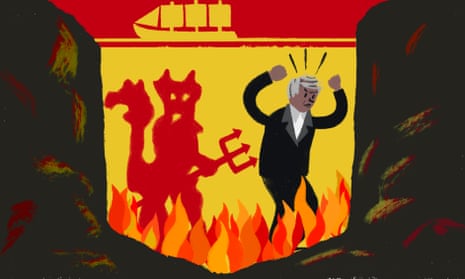“I am bound upon a wheel of fire, that mine own tears do scald like molten lead”.
I tried not to write a José Mourinho column ever again. Even starting this one it feels only right to acknowledge there is no obvious excuse for talking quite so much about a football manager who is, for all his widescreen presence, a surprisingly prosaic character these days.
This has become a self-sustaining personality obsession. Currently the most startling thing about Mourinho is the fact everybody still finds him so startling. The most interesting thing is the sheer level of interest. Mourinho’s extraordinary, enduring celebrity seems above all to be based around his extraordinary, enduring celebrity.
For how much longer? Hold your ear to the page, edge closer to the television during one of those slightly frightening José close-ups – the greatest romantic lead of the Premier League years clanking about on the touchline like a dying robot – and you can almost hear the creaking of the plates, that ever-widening gulf between the amount of time spent talking about Mourinho and the level of actual interest in a manager with one league title in six seasons who is doing a decent job with a so-so Manchester United team.
Personality obsession in football often seems impossibly vivid, but these things can also die quite quickly. A few months ago I estimated that I had, over the last 15 years, written an average of 500 words every week about Wayne Rooney, which adds up to almost 400,000 words, or the equivalent of six whole Rooney-based novels.
From the adolescent Rooney, a human being made entirely from Fanta and Ritz crackers and plastic explosive, all cold, vengeful power and craft; through to late, dutiful Rooney, wrestling doggedly with his own limitations, it was a process of incremental exhaustion.
By the end the flame had simply gone. A few weeks ago I was asked to write something about Rooney for a German magazine and found myself slipping into a kind of sleep-state, hands pawing uselessly at the keyboard, a few isolated phrases – “milk-white”, “Moon face”, the words “WaYn RoONeyyy” – repeating themselves across six pages of fluent, senseless Rooney screed.
Right now t he same process of entropy is beginning to apply itself to Mourinho, and not only among those who tired of his vaulting egotism years ago. Let’s face it, we know what’s going on there.
Mourinho has done a fair job at United. But he has clearly failed in his obvious, all-engulfing desire to outperform Pep Guardiola, who has engineered a genuinely memorable team at Manchester City. In his shadow Mourinho has become ordinary, failing to overachieve, but also failing to fall short in a way that is gripping or exciting or even very notable, a jarringly non-fascinating object of eternal fascination.
Except, perhaps not quite yet. There is one last thing. Reading Mourinho’s odd statements this week about other managers buying success, the sightly desperate attempts to tailor the Manchester United football-industrial complex as a spunky underdog, it might be easy to gloss this as standard deflection tactics.
But not quite. Something else is going on here. Quietly, insidiously, something awful is happening to Mourinho, perhaps the worst thing that could possibly happen. In Dante’s Inferno hell is portrayed as a place where sinners enter a special cell designed to aggravate and mock their own worst excesses. Those guilty of wrath are made to fight each other in the filthy waters of the river Styx. Thieves have their souls stolen. Flatterers are pelted – quite literally – with bull shit.
Welcome then, José, to your own Danteian circle. In a moment of bespoke personal hell it turns out Mourinho’s only function in the Premier League this season is to validate and endorse and magnify the success of his greatest rival. The talk about money and about buying success: this is Mourinho’s last jibe, the final get-out, the only bit of wriggle room left as he tries to process the spectacle of Guardiola creating his wonderful title-bound team.
And yet by a beautifully awkward piece of personal theatre it is Mourinho’s lot to provide the counter-argument, absolving Guardiola from such criticism by acting as the control: spending more or less the same on players in the last two seasons but playing worse football and winning fewer games.
Mourinho has two more trophies but City have the points and the goals and the laurels, a team woven together out of young attacking talent and notable improvements for the likes of Nicolás Otamendi, who still rumbles around the pitch like a large piece of garden furniture bent on performing a series of violent assaults, but who is now all set to take his place in one of the really memorable title-winning teams of the last 25 years.
Obviously the issues in such a feat are more complex than simply money. To judge a manager in these terms is facile. But football is facile. Football managers are facile when it suits them. And so Mourinho gets to disprove his own last remaining gripe about bought success, an unusually cruel state of affairs, and one that seems certain to be played out in close up, excruciating, oddly gripping super slow-mo over the next five months.
The obvious point is that Mourinho does have a way out of this. He is simply at the wrong kind of club, struggling with an ill-fitting loss of scale. The truth of his two-stage elite level career. Mourinho has been afflicted with a version of the Peter Principle ever since he left Inter for Real Madrid. The thing he is unarguably brilliant at, the source of his two great triumphs in the Champions League, is urging a middleweight top-tier power to heavyweight glory, bending an ambitious bunch of players to his will, with no pressure to do anything other than organise and win and gloat, handsomely, his own star player throughout.
Mourinho may yet extend his contract at Old Trafford. He may still create a genuinely memorable team out of the current sifting and sorting. For now he’s left to fret and bellyache, glowering in grey quilted coat and tracksuit bottoms, and looking at times like a man with a wall-eyed hangover who’s just popped out to the garage for an Irn Bru, forgotten where he lives, lost his keys, fallen asleep on a bus, woken up with his face in a bag of chips, got lost again, followed someone he thought was someone else and ended up prowling around on some alien touchline trying to work out how to reorganise a depleted three-man backline halfway through a second-half defensive rearguard.
For now, and despite appearances, Mourinho remains far from ordinary, still lashed to that personalised wheel of pain, with a star supporting role in someone else’s half-season triumph that every snort, every bleat, every moan about money only serves to intensify.

